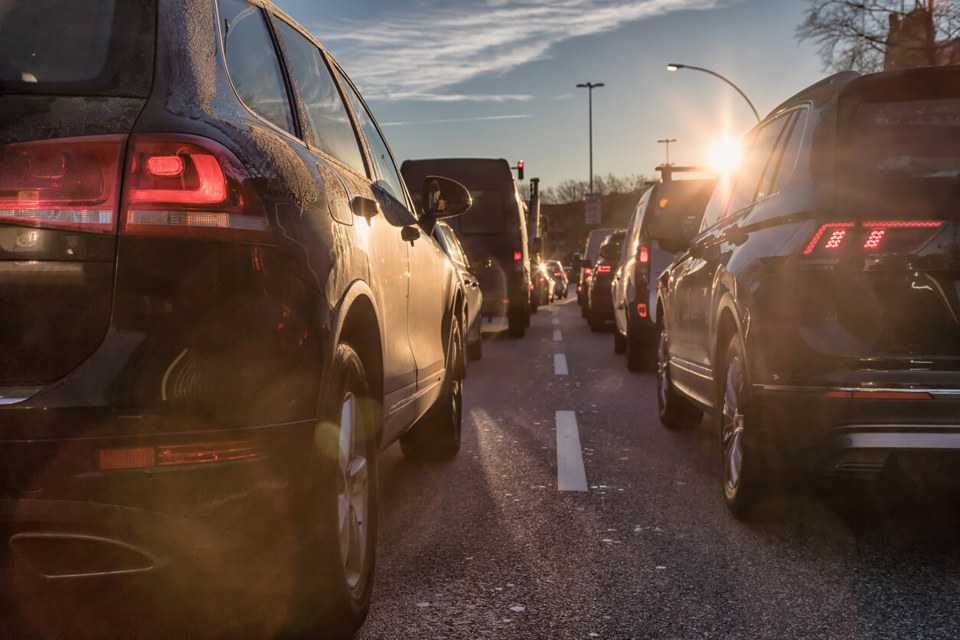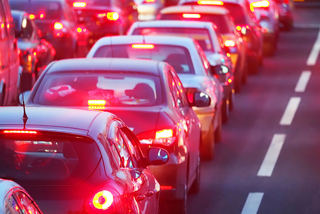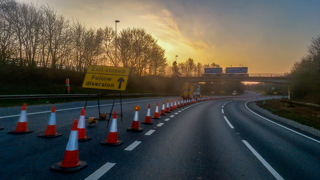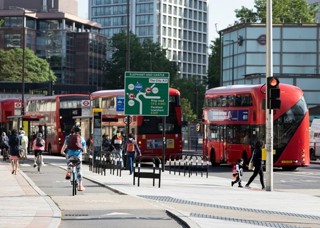The UK is ranked as the fourth most congested developed country in the world and the third most congested in Europe, with drivers spending an average of 32 hours a year in congestion during peak hours, according to Inrix.
For the first time, the Inrix Traffic Scorecard also includes the direct and indirect costs of congestion to all UK motorists, which amounted to £30.8 billion in 2016, an average of £968 per driver.
In the UK, the 2016 Traffic Scorecard analysed congestion in 87 cities and large urban areas.
London remains the UK’s most congested city, and ranks second in Europe after Moscow and seventh in the world.
Drivers in London spent an average of 73 hours in gridlock during peak hours. This contributed to congestion costing London drivers £1,911 each and the capital as a whole £6.2bn from direct and indirect costs.
Direct costs relate to the value of fuel and time wasted, and indirect costs relate to freighting and business fees from company vehicles idling in traffic, which are passed on to household bills through higher prices.
Along with the capital, Manchester, Aberdeen, Birmingham and Edinburgh make up the UK’s five most congested cities. Drivers in Manchester spent 39 hours in congestion during peak hours, and 10% of their total drive time (peak and non-peak hours) in gridlock, costing each driver £1,136 and the city £233 million. Motorists in Birmingham spent 9% of their total drive time in congestion last year, costing the city £407 million.
Major cities in Scotland feature high-up in the UK ranking, with Aberdeen and Edinburgh placing third and fifth respectively. The combined cost to both cities in 2016 was £363 million.
“Despite Brexit, 2016 saw the UK economy remaining stable, fuel prices staying low and employment growing to an 11-year high, all of which incentivizes road travel and helped increase congestion as the 2016 Traffic Scorecard demonstrates,” said Graham Cookson, chief economist, Inrix. “The cost of this congestion is staggering, stripping the economy of billions, impacting businesses and costing consumers dearly.
“To tackle this problem, we must consider bold options such as remote working, wider use of road user charging and investment in big data to create more effective and intelligent transportation systems.”
Inrix 2016 Traffic Scorecard – UK’s 10 Most Congested Cities / Large Urban Areas
|
Rank |
City / Large Urban Area |
2016 Peak Hours Spent in Congestion |
Percentage of Total Drive Time in Congestion (peak and non-peak hours) |
Total Cost Per Driver in 2016 |
Total Cost to the City in 2016 (based on city population size) |
|
1 |
London |
73 |
12.7% |
£1,911 |
£6.2bn |
|
2 |
Manchester |
39 |
9.9% |
£1,136 |
£233m |
|
3 |
Aberdeen |
35 |
12.3% |
£1,331 |
£138m |
|
4 |
Birmingham |
34 |
8.5% |
£990 |
£407m |
|
5 |
Edinburgh |
31 |
9.8% |
£1,009 |
£225m |
|
6 |
Guildford |
29 |
8.6% |
£812 |
£44m |
|
7 |
Luton |
29 |
10.7% |
£964 |
£72m |
|
8 |
Bournemouth |
27 |
10.8% |
£1,019 |
£84m |
|
9 |
Hull |
27 |
9.4% |
£970 |
£109m |
|
10 |
Bristol |
27 |
8.8% |
£845 |
£154m |
Inrix 2016 Traffic Scorecard Provides In-Depth City Congestion Analysis
New to the Traffic Scorecard is the ability to study congestion at different times of the day and across different parts of the road network, such as analysing traffic in city centres compared to vehicles coming in and out of a city, inside and outside of peak hours and at weekends. Insights for the UK include:
Overall (Peak & Non-Peak) Congestion Insights
- London is the worst city for congestion in the UK across both peak and non-peak hours with drivers spending an average of 13% of their total drive time stuck in traffic.
- Aberdeen is the second worst city across both peak and non-peak hours combined, with drivers spending 12% of their total drive time in gridlock.
City Centre Insights
- Peak hours in the centre of London is the worst time and place for drivers in the capital, where they spent an average of 23% of their time in congestion at an average speed of 4 mph.
- However, Exeter’s city centre was the busiest to get around across all of the UK during peak hours, with drivers spending 25% of their time in congestion with an average speed of just 4.6 mph.
- Speeds fell by 80% (20 mph to 4.3 mph) in the centre of London during the day when congestion was at its worse, and by 83% (24 mph to 4 mph) in the evening during the worst periods.
In and Out of City Insights
- When getting in and out of London at peak hours, drivers achieved an average congested speed of 14.6 mph and spent 15% of their time in congestion.
- Aberdeen eclipses even London at peak hours and was the hardest city to get in to or out of with drivers stuck in gridlock for 24% of the time, moving at an average speed of 5.5 mph.
Business Impact
- Business suffers the most from traffic in Cardiff with daytime congestion within the city occurring for 15% of the time on average.
- Businesses moving about the city centres of Exeter and London also suffer badly from congestion, sitting in traffic in the city centre 17% and 16% of the time respectively during the day.
Weekend Insights
- Blackpool and London have the highest weekend congestion rates of 13% of drive time, but drivers cruise at their slowest in Brighton and Belfast where weekend congested speeds are just 4.3 mph.
Britain’s Most Congested Roads
INRIX also identified the UK’s most congested roads as well as the worst time to travel. London roads were busiest at evening rush-hour with the A406 Northbound from Chiswick Roundabout to Hanger Lane identified as the UK’s most congested, where motorists spent 73 hours in congestion on this road in 2016.
Outside of the capital, the A1 Southbound from College Gardens in Belfast was the most congested road, and the 6th worst congested in the UK, with drivers each spending 49 hours in gridlock last year.
Inrix 2016 Traffic Scorecard – UK’s Top Ten Most Congested Roads in 2016
|
Rank |
City / Large Urban Area |
Road |
From |
To |
Worst Peak Period |
Total Hours of Delay |
|
1 |
London |
A406 Northbound |
Chiswick Roundabout |
Hanger Lane |
PM |
73 |
|
2 |
London |
A2 Eastbound |
New Cross Gate |
Prince Charles Rd |
PM |
62 |
|
3 |
London |
A3211 Eastbound |
Westminster Bridge |
London Bridge |
PM |
57 |
|
4 |
London |
A102 Northbound |
A2/Kidbrooke |
Blackwall Tunnel |
AM |
51 |
|
5 |
London |
A4200 Southbound |
Russell Square |
Aldwych |
PM |
50 |
|
6 |
Belfast |
A1 Southbound |
College Gardens |
Wallace Park |
PM |
49 |
|
7 |
London |
A308 Eastbound |
Putney Bridge Approach |
Sloane Square |
PM |
46 |
|
8 |
Bristol |
A431 Westbound |
Bryants Hill |
Lawrence Hill |
AM |
45 |
|
9 |
Belfast |
A24 Northbound |
Ormeau Road |
Ann Street |
AM |
45 |
|
10 |
Manchester |
A6 Northbound |
Macclesfield Road |
Heaton Lane |
AM |
44 |
UK vs. Europe: How do we Measure Up?
Of the 628 European cities analysed, Moscow topped the list as the most congested in Europe, where drivers spent 91 hours last year in traffic congestion at peak hours.
Drivers in Moscow spent over 25% of their total drive time (peak and non-peak hours) in congestion. London (73 hours) is second in the list of Europe’s most congested cities, followed by Paris (65 hours), Istanbul, (59 hours) with Krasnodar (56 hours) in Russia rounding out the top five. Manchester, the UK’s second most congested city ranked 18th.
Inrix 2016 Traffic Scorecard – 10 Most Congested Cities in Europe in 2016
|
Rank |
European City |
Country |
2016 Peak Hours Spent in Congestion |
Percentage of Total Drive Time in Congestion (peak and non-peak hours) |
|
1 |
Moscow |
Russia |
91 |
25.2% |
|
2 |
London |
UK |
73 |
12.7% |
|
3 |
Paris |
France |
65 |
11.4% |
|
4 |
Istanbul |
Turkey |
59 |
18.6% |
|
5 |
Krasnodar |
Russia |
56 |
24.3% |
|
6 |
Zurich |
Switzerland |
54 |
18.2% |
|
7 |
Saint Petersburg |
Russia |
53 |
20.0% |
|
8 |
Sochi |
Russia |
49 |
24.4% |
|
9 |
Munich |
Germany |
49 |
14.5% |
|
10 |
Nizhny Novgorod |
Russia |
47 |
19.7% |
How the UK Compares to Cities & Countries Worldwide
At the global city level, Los Angeles tops the list of the world’s most gridlock cities, with drivers spending on average 104 peak hours in congestion in 2016, followed by Moscow (91 hours), New York (89 hours), San Francisco (83 hours) and Bogota (80 hours). London ranked 7th out of the 1,064 cities analysed, after Sao Paulo at 6th where drivers spent 77 peak hours in congestion last year.
Inrix 2016 Traffic Scorecard – 10 Most Congested Cities in the World in 2016
|
Rank |
Global City |
Country |
Continent |
2016 Peak Hours Spent in Congestion |
Percentage of Total Drive Time in Congestion (peak and non-peak hours) |
|
1 |
Los Angeles |
USA |
North America |
104 |
12.7% |
|
2 |
Moscow |
Russia |
Europe |
91 |
25.2% |
|
3 |
New York |
USA |
North America |
89 |
12.8% |
|
4 |
San Francisco |
USA |
North America |
83 |
12.8% |
|
5 |
Bogota |
Colombia |
South America |
80 |
31.8% |
|
6 |
Sao Paulo |
Brazil |
South America |
77 |
20.8% |
|
7 |
London |
UK |
Europe |
73 |
12.7% |
|
8 |
Atlanta |
USA |
North America |
71 |
10.0% |
|
9 |
Paris |
France |
Europe |
65 |
11.4% |
|
10 |
Miami |
USA |
North America |
65 |
8.7% |
Of the 38 countries covered by the Inrix Traffic Scorecard, Thailand leads with the highest average hours spent in peak congestion (61 in 2016), outranking Columbia (47 hours) and Indonesia (47 hours) tying at 2nd, and Russia (42 hours) and the USA (42 hours) tying at 4th. The UK was 11th in the global ranking, 4th amongst developed nations, and the 3rd most congested in Europe behind Russia and Turkey.
Inrix 2016 Traffic Scorecard – 15 Most Congested Countries in the World in 2016
|
Rank |
Country |
Continent (Europe Ranking) |
2016 Peak Hours Spent in Congestion |
|
1 |
Thailand |
Asia |
61 |
|
2 |
Colombia |
South America |
47 |
|
2 |
Indonesia |
Asia |
47 |
|
4 |
Russia |
Europe (1) |
42 |
|
4 |
USA |
North America |
42 |
|
6 |
Venezuela |
South America |
39 |
|
7 |
South Africa |
Africa |
38 |
|
8 |
Brazil |
South America |
37 |
|
8 |
Puerto Rico |
North America |
37 |
|
10 |
Turkey |
Europe (2) |
34 |
|
11 |
UK |
Europe (3) |
32 |
|
12 |
Germany |
Europe (4) |
30 |
|
12 |
Slovakia |
Europe (4) |
30 |
|
14 |
Canada |
North America |
28 |
|
14 |
Luxembourg |
Europe (6) |
28 |
|
Rank |
Country |
Continent (Europe Ranking) |
2016 Peak Hours Spent in Congestion |
|
1 |
Thailand |
Asia |
61 |
|
2 |
Colombia |
South America |
47 |
|
2 |
Indonesia |
Asia |
47 |
|
4 |
Russia |
Europe (1) |
42 |
|
4 |
USA |
North America |
42 |
|
6 |
Venezuela |
South America |
39 |
|
7 |
South Africa |
Africa |
38 |
|
8 |
Brazil |
South America |
37 |
|
8 |
Puerto Rico |
North America |
37 |
|
10 |
Turkey |
Europe (2) |
34 |
|
11 |
UK |
Europe (3) |
32 |
|
12 |
Germany |
Europe (4) |
30 |
|
12 |
Slovakia |
Europe (4) |
30 |
|
14 |
Canada |
North America |
28 |
|
14 |
Luxembourg |
Europe (6) |
28 |






















Darren - 20/02/2017 11:04
We recently had a meeting with a group from the council offering our area 'better streets' to discuss changes to the roads in our area (West London), an area of which has terrible traffic issues. Everyone of our suggestions for freeing up traffic flow (like removing a bus lane which forces traffic from two lanes to one, putting bus stops off the carriageway to allow traffic to flow when busses are picking up/dropping off, adding a roundabout at a bad junction, no right turn into another junction etc) were ignored. Instead the council want to put in a second set of light controlled crossings, a speed-hump, close off one of the entrances to a minor road which would force more traffic through 'rat runs', and adding more trees to encourage traffic to slow down, somehow. All this is going to do is make the traffic problems even worse. Councils need to start looking at opening roads up to allow better traffic flow, removing bottle necks, discouraging of rat runs, and in general more intelligent traffic control systems. While this attitude remains, then the traffic problems will only ever get worse.